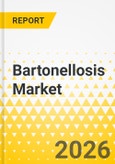Understanding Bartonella bacteria is critical for improving diagnostic, management, and therapeutic strategies for the diseases they cause. Due to their intracellular nature and difficulty in culturing, Bartonella infections often go underdiagnosed or misdiagnosed. Advanced molecular techniques like Digital PCR and serology are typically required for accurate identification. Treatment generally includes antibiotics such as doxycycline, azithromycin, or rifampin, depending on the species and severity of infection. Increased awareness, improved diagnostic tools, and targeted therapies are essential to managing these infections more effectively and reducing their global health burden.
The global Bartonellosis market is primarily driven by the rising prevalence of zoonotic infections, which has significantly heightened the demand for effective diagnostics and therapeutic solutions. Bartonellosis, transmitted through vectors such as sandflies and animal scratches, is gaining attention due to its increasing incidence, particularly in tropical and under-resourced regions. Alongside this, enhanced awareness and surveillance initiatives led by governments and non-governmental organizations are playing a crucial role in improving early detection and disease management. These programs are especially impactful in endemic areas, where timely intervention can reduce disease burden. Additionally, advancements in molecular diagnostics particularly the use of PCR and serological testing are enabling more accurate identification of Bartonella infections, which are otherwise difficult to culture and diagnose through conventional means. This progress in diagnostic technology is helping to unlock the unmet potential of the Bartonellosis market by facilitating faster, more reliable, and targeted treatment approaches.
The growth of the global Bartonellosis market faces significant challenges, primarily stemming from low disease awareness and frequent misdiagnosis. Due to its non-specific symptoms, Bartonellosis is often mistaken for other febrile illnesses such as malaria or typhoid, leading to delayed or inappropriate treatment. This issue is further compounded by a lack of clinical familiarity with the disease, particularly in non-endemic regions. Another major restraint is the limited availability of approved, targeted treatments - most current therapies rely on off-label use of broad-spectrum antibiotics, which may not always be effective and can contribute to antimicrobial resistance. Additionally, the weak surveillance infrastructure in many endemic regions, such as parts of South America and Africa, poses a barrier to timely detection and reporting. This lack of reliable epidemiological data hampers both public health responses and market development, restricting investment in research, diagnostics, and therapeutic solutions.
The competitive landscape of the global Bartonellosis market is gradually emerging, driven by the increasing need for targeted therapies and improved diagnostic tools for this neglected zoonotic disease. While currently dominated by generic antibiotic treatments, the market is seeing growing interest from pharmaceutical and biotech companies in developing more specific antimicrobial agents and host-targeted therapies to address the complex manifestations of Bartonella infections. Companies such as Pfizer, Merck & Co., and GlaxoSmithKline, with broad anti-infective portfolios, are well-positioned to expand into this niche market through research partnerships and drug repurposing strategies. Additionally, advancements in molecular diagnostics and point-of-care testing are attracting investment, particularly in regions with high disease prevalence like parts of Latin America and sub-Saharan Africa. Collaborative efforts between global health organizations, academic institutions, and industry stakeholders are critical in addressing the current gaps in treatment, surveillance, and awareness. As awareness of Bartonellosis grows and its public health impact becomes more recognized, the market is expected to evolve toward more specialized, accessible, and innovative solutions tailored to both endemic and non-endemic settings.
The global Bartonellosis market presents significant untapped opportunities, particularly in emerging regions such as Latin America and parts of Africa where the disease burden is highest. Countries like Peru, where Bartonella bacilliformis infections are endemic, offer considerable potential for the introduction of advanced diagnostics and effective treatment solutions tailored to local needs. Furthermore, there is a growing opportunity for the development of targeted antibiotic therapies and novel immunomodulators that can overcome current limitations associated with off-label drug use and rising antibiotic resistance. Innovation in pathogen-specific therapeutics could greatly enhance treatment outcomes and reduce relapse rates. Additionally, increased recognition of Bartonellosis as a neglected tropical disease (NTD) by global health organizations may drive dedicated R&D funding and foster cross-sector collaborations, accelerating progress in diagnostics, therapeutics, and public health initiatives. These opportunities collectively position the Bartonellosis market for strategic growth and innovation in the coming years.
Market Segmentation:
Segmentation 1: by Drug Type
- Antibiotics
- Antimicrobial agents
- Immunomodulators
- Others
Segmentation 2: by Route of Administration
- Oral
- Topical
- Intravenous
Segmentation 3: by Diseases Type
- Bartonella henselae
- Bartonella bacilliformis
- Bartonella quintana
- Bartonella elizabethae Intravenous
Segmentation 4: by End Users
- Hospitals & Specialty clinics
- Research institutions
- Others
Segmentation 5: by Region
- North America
- Europe
- Asia-Pacific
This product will be updated with the latest data at the time of order. Consequently, dispatch time for this product will be 7-10 business days.
Table of Contents
Companies Mentioned
- Pfizer Inc.
- Teva Pharmaceuticals Ltd.
- Sun Pharmaceutical Industries Ltd.
- Eli Lilly and Company
- Aurobindo Pharma
- Merck & Co.
- Aurobindo Pharma
- F. Hoffmann-La Roche Ltd.
- AstraZeneca








